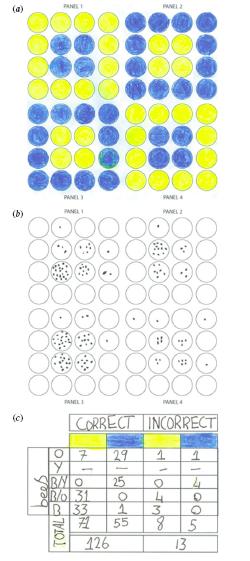Ever wish you didn’t need those pesky references, formal writing style, or time consuming computer graphics when going to publish your work? A new study published in Biology Letters demonstrates that as long as your science is well done, nothing else matters. The project I’m referring to was done by a group of 8-10 year old elementary school children under the guidance of an ophthalmology professor at University College London (Dr. Beau Lotto), and studied the ability of bumblebees to utilize colour and spatial information while foraging. There have been papers published in the past by student researchers, but what makes this paper special is that the students not only helped with the experiments, but dictated the actual paper itself over a Coke at the local pub and hand drew the figures!
There are absolutely no references within the paper as it was argued that the comprehension level of the background material was beyond that of the research group, and ultimately irrelevant to their experimental design and conclusions. Likewise, the writing itself is refreshingly simple and full of truths that many researchers (or at least many grad students I know) can’t put into their papers. My favourite quote (discussing the need to train the bees prior to experimentation):
We did this so that they would learn not to go just to the colours, but had to learn the pattern. Otherwise they might fail the test, and it would be a disaster.
It apparently took Lotto 18 months to find a journal willing to accept it for review given its unorthodox style, with the likes of Nature, Science and pLOS One turning it down before the Royal Linnean Society agreed to run with it. Biology Letters included several independent commentaries on the paper vouching for the novelty of the study. The research itself is a nice little example of citizen science, and worth a read all on its own, but the style in which it was presented is a huge paradigm shift for the scientific community. While I wouldn’t want this sort of publication to become commonplace, it does illustrate that just because someone doesn’t have the resources of an extensive library or 8 years of postgraduate work (heck, even a high school diploma) behind them, doesn’t mean they have nothing to contribute to our understanding of the natural world. The kids say it best:
Science is cool and fun because you get to do stuff that no one has ever done before.
Reference:
Blackawton, P. S., S. Airzee, A. Allen, S. Baker, A. Berrow, C. Blair, M. Churchill, J. Coles, R. F. J. Cumming, L. Fraquelli, C. Hackford, A. Hinton Mellor, M. Hutchcroft, B. Ireland, D. Jewsbury, A. Littlejohns, G. M. Littlejohns, M. Lotto, J. McKeown, A. O’Toole, H. Richards, L. Robbins-Davey, S. Roblyn, H. Rodwell-Lynn, D. Schenck, J. Springer, A. Wishy, T. Rodwell-Lynn, D. Strudwick and R. B. Lotto “Blackawton bees.” Biology Letters.
http://rsbl.royalsocietypublishing.org/content/early/2010/12/18/rsbl.2010.1056.abstract
Thanks to Danielle Fife for passing along the story!




How cool.
What a great line!
I think that’s the general sentiment of every grad student or researcher embarking on a new project, they just may not voice it! Funny to see it’s apparently ingrained in humans from birth!
I. freaking. LOVE. this.
I literally laughed out loud while sitting in the lab reading this paper, grinning from ear to ear. A great pick-me-up going into the Christmas season!
Our department’s weekly graduate journal club looked at this paper today (I was like, “oh yeah – I saw this on Morgan’s blog!” It sparked one of the most interesting and lively discussions we’ve had in a long time!
Very cool Geek, thanks for letting me know! This is one of the coolest papers of the year I think.
Yeah, I agree. It could end up being a classic, not necessarily because it churned out results that were earth-shattering, but because it could potentially turn the way we think about doing science on its head. I kind of hope it does!